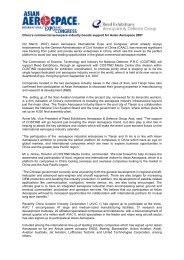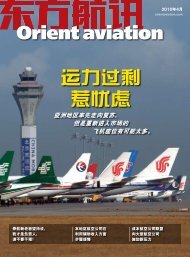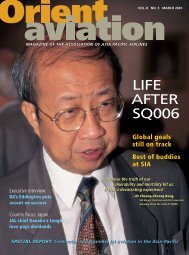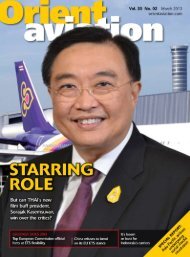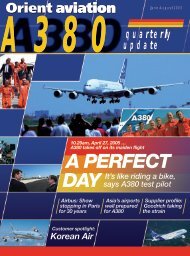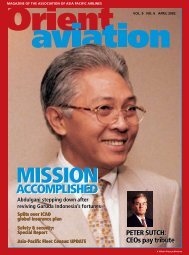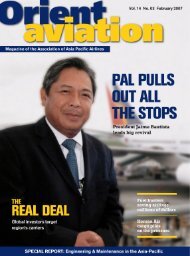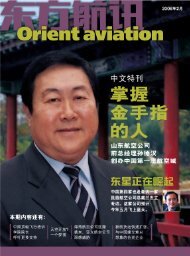Create successful ePaper yourself
Turn your PDF publications into a flip-book with our unique Google optimized e-Paper software.
to methods used to licence his long-haul,<br />
low-cost carrier led to a four-month delay<br />
of its launch. A first service to Gatwick has<br />
to wait until at least next March and others<br />
to European and U.S. cities will now come<br />
that much later. Miller, the founding chief<br />
executive of Dragonair 20 years ago, was<br />
not happy.<br />
Three new private airlines began business<br />
in China itself. Okay Airlines, based in<br />
Tianjin near Beijing, was the first to take<br />
off, with Spring Airlines of Shanghai and<br />
United Eagle Airlines of Chengdu following<br />
quickly. Lower fares than those on offer at<br />
the major airlines were promised, but fixed<br />
landing fees and fuel price controls make<br />
that more difficult to achieve in China than<br />
elsewhere.<br />
In fact, fuel prices ate heavily into<br />
profits at Air China and Shanghai Airlines<br />
and caused interim year losses at China<br />
Southern Airlines, China Eastern Airlines<br />
and Hainan Airlines, which was reported to<br />
be heading for an initial public offering (IPO)<br />
in Hong Kong.<br />
Toshiyuki Shinmachi, the new man in<br />
charge at Japan Airlines (JAL), who stepped<br />
into a safety crisis that cost Isao Kaneko his<br />
job as JAL chairman and chief executive –<br />
following reprimands by Japan’s Ministry<br />
of Land, Infrastructure and Transport – is<br />
facing a major challenge. Katsuo Haneda<br />
also quit as JAL International president and<br />
other senior staff were demoted.<br />
Shinmachi was not only tasked with<br />
refurbishing JAL’s image, he also has<br />
to see through the consolidation of the<br />
complex merger with one-time rival, Japan<br />
Air System (JAS), ensure operating costs<br />
are cut in accordance with a tough midterm<br />
plan and, for the first time, keep JAL<br />
consistently profitable. All this in a time of<br />
sky-high fuel prices.<br />
Phuket Air was also the subject of safety<br />
concerns. Its entire domestic operation was<br />
grounded by Thailand’s Department of Civil<br />
Singapore Airlines: talk in government circles of<br />
an SIA – Qantas merger remains just that – talk<br />
<strong>Aviation</strong> after a YS-11 overshot the runway<br />
at Mae Sot, coming to rest in muddy ground<br />
beyond. Earlier in the year, British inspectors<br />
grounded one of its B747-200s at Gatwick<br />
because of safety concerns and refused to<br />
allow another to carry passengers.<br />
Elsewhere, talk of a merger between<br />
Singapore Airlines (SIA) and Qantas<br />
Airways remained just that, talk, although<br />
SIA chief executive, Chew Choon Seng, did<br />
express surprise at comment from Australian<br />
Prime Minister, John Howard, and Singapore<br />
Transport Minister, Yeo Chow Tong, that<br />
appeared to canvass the prospect of a union<br />
between the rivals.<br />
In Australia itself, Paul Stoddart, the<br />
owner of leasing company, European<br />
<strong>Aviation</strong>, and, incidentally, the former owner<br />
of Formula 1 racing team Minardi (which he<br />
recently sold), announced his plan to launch<br />
an all-business class budget carrier, Ozjet<br />
Airlines. His idea is to offer corporate-style<br />
travel at economy rates, first using three<br />
B737-200s kitted out with only 60 seats.<br />
The aim is for a final fleet of 10 aircraft. Not<br />
everyone was convinced he would succeed.<br />
Ozjet commenced flying on November 29.<br />
Meanwhile, Regional Express (Rex),<br />
Australia’s largest independent regional<br />
airline, claimed an overwhelming response<br />
to its A$35 million (US$26 million) IPO. It<br />
was formed three years ago when Kendell<br />
and Hazelton Airlines joined forces,<br />
following the collapse of Ansett.<br />
And, in a final twist that is fascinating<br />
aviation watchers, Australian logistics<br />
group, Toll Holdings, launched a hostile<br />
A$4.6 billion takeover bid for rival transport<br />
firm Patrick Corp, in a move that could put<br />
Virgin Blue back in the hands of Sir Richard<br />
Branson’s Virgin Group.<br />
Under Toll’s game plan, Patrick’s stake<br />
in the airline would be reduced, giving the<br />
British entrepreneur the chance to increase<br />
his interest again. Branson is said to like the<br />
idea.<br />
Pilot shortages<br />
put pressure<br />
on training<br />
The cockpit crew crisis debate<br />
continued in 2005 with carriers in<br />
the newer markets of China and<br />
India the worst hit, but airlines across the<br />
region are also facing problems. It was one<br />
thing to hire or train a pilot, it seemed, quite<br />
another to hang on to him or her as pressure<br />
from fleet expansions and low-cost carrier<br />
(LCCs) growth made their mark on the<br />
market.<br />
Better money on<br />
offer from LCCs and<br />
private start- ups<br />
meant state-owned<br />
carriers in China and<br />
India were constantly<br />
losing staff, or were<br />
unable to find enough<br />
pilots to match their<br />
expansion plans.<br />
Figures aired in<br />
2005 were staggering.<br />
India, it was said,<br />
TRAINING<br />
Malaysia Airlines:<br />
increased pilots<br />
salaries by 25%<br />
would need 4,000 pilots in the next five years.<br />
China must find up to 40,000 in the next two<br />
decades. Figures from Airbus and Boeing<br />
put the annual shortfall across the region at<br />
nearly 6,000, and that was an underestimate,<br />
observers said.<br />
Some Chinese carriers are using western<br />
recruitment companies to find expatriate<br />
flyers who are paid at higher rates than<br />
locals. India’s aviation secretary, Ajay<br />
Prasad, held top-level meetings with airlines<br />
to try to stamp out poaching.<br />
India too is hiring foreigners. Reports<br />
talked of schedule disruptions in both<br />
countries due to crew shortages. Malaysian<br />
Airlines (MAS), which has lost 80 pilots in<br />
the last 18 months, tried the direct approach:<br />
while denying any kind of crisis, it increased<br />
salaries by 25%.<br />
Training schools were doing brisk<br />
business, with those owned by carriers often<br />
looking to expand. That was especially so<br />
in China where ab initio training is more<br />
available domestically after restrictions on<br />
general aviation were relaxed.<br />
DECEMBER 2005-JANUARY 2006 ORIENT AVIATION 51




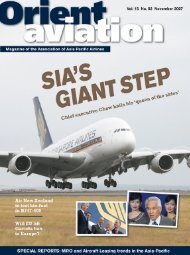
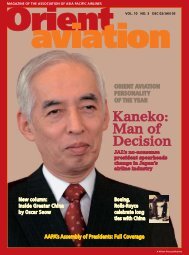
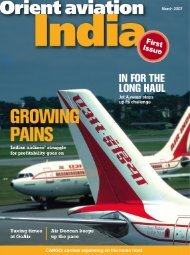
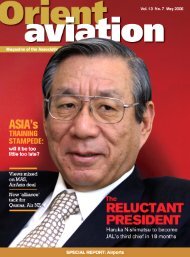
![OAMag-V7N4-Cover [Converted] - Orient Aviation](https://img.yumpu.com/48598575/1/190x255/oamag-v7n4-cover-converted-orient-aviation.jpg?quality=85)

